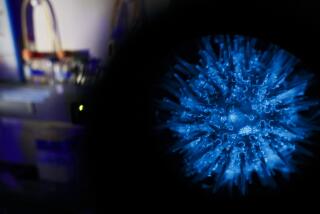Humble Fruit Flies Helped Prizewinner Study Genetics
- Share via
PASADENA — No, the baby chick wasn’t quite right. Neither was the fish, nor the chameleon.
Ah, the fruit fly. Now there’s a fine specimen, thought Caltech Prof. Seymour Benzer, a neurobiologist of world renown.
It was the mid-1960s, and Benzer was looking for an animal, an insect, something to help him understand how genes affect human behavior; to help him understand why his two daughters, born six years apart, behaved so darn differently.
He seized upon the lowly fruit fly, a tiny, pesky insect that most people swat from their overripe mangoes without a second thought; the fruit fly, with a pinhead-sized brain and with taste buds in its feet. Mutant strains of fruit flies, to be exact, which Benzer and his colleagues named “Drop-dead” and “Wings-up.”
Benzer’s work with Drop-dead and Wings-up helped scientists understand how the human brain and nervous system develop and work, and gave him clues to understanding his daughters’ differences.
In March, the Royal Swedish Academy recognized Benzer’s 30 years of genetic research--much of it with fruit flies--by naming him co-winner of the $333,000 Crafoord Prize. He will share the award with William D. Hamilton of Oxford University in England. The academy, which awards the Nobel prizes in chemistry and physics, gives the prestigious Crafoord each year in a field not covered by the Nobels. Benzer will receive his prize from the king of Sweden on Sept. 28.
Benzer, 71, is painstakingly shy about all the hoopla. The San Marino resident prefers to stick with safe talk about “monoclonal antibodies” and “photoreceptor cells,” the kind of big words that panic those not scientifically inclined.
During a recent interview, the professor’s white lab coat pocket was jammed with a ruler, scissors, pencils and pens, and his glasses dangled from a cord around his neck. His tie was askew.
He spoke so softly that it was difficult to hear him. The answers came swiftly, and surely, for questions of science; hesitantly and self-consciously for questions about himself. He even balked at a personal question masquerading as a science question--on how exactly his daughters are different.
But Benzer’s colleagues say he is simply modest and shy in public. The private Benzer plays the violin, regularly tunes to “shock-jock” Howard Stern’s morning radio program, takes his graduate students to Forest Lawn Memorial Park for fun and pulls practical jokes. He is the type, his colleagues say, who delights in finding that new, authentic Chinese restaurant in Monterey Park and ordering duck’s feet.
His graduate students, who speak about him with reverence, call him Seymour. They marvel at his curiosity and his instinct; one mentioned that Benzer goes to staff meetings with a hand-held microscope in his pocket so he can whip it out whenever something strikes his fancy.
“There’s a real theme I see running in his life,” said graduate student William Leiserson, 34. “That is the unusual.”
Added graduate student Erich Schwarz, 28: “His instinct is to choose things around him that are very new and that strike everyone else as strange.”
Benzer’s instinct led him to the fruit fly 30 years ago, in a chase to study what once seemed an improbable link between behavior and genetics. He chose fruit flies because they breed quickly and are studied easily. The tiny insects have more in common with humans than most people care to know--they have vision, hearing, memory and 24-hour sleep-and-wake cycles. In fact, fruit fly genes are similar to human genes.
What Benzer’s work did was advance the study of how genes affect behavior and diseases, such as retinitis pigmentosa and Alzheimer’s, by turning normal flies into mutants with genetic damage. The genetic damage causes particular types of behaviors or health problems that scientists can study and apply to human defects. He was the first to use gene mutations to study behavior in fruit flies and relate the research to the human nervous system and behavior.
He found that blind flies have a genetic defect similar to the one involved with human retinitis pigmentosa and that the Drop-dead strain has a degenerative brain disorder similar to Alzheimer’s disease.
Another area of research involves wake-sleep cycles. Benzer determined that abnormal flies have 28-hour, 17-hour or other erratic cycles. He found that the erratic cycles had to do with a certain gene; the finding is expected to help scientists understand human behavior in relation to night-shift work and jet lag.
“He’s a real scientist,” said Caltech biology professor Edward Lewis, a pioneer geneticist.
The son of Polish immigrants, Benzer grew up in Brooklyn with three sisters. At age 13, his brother-in-law gave him a microscope, and his world changed. While other boys played stickball in the street, he studied bits of animal tissue and wriggling protozoa in water. Benzer wanted to know: How did they work? How were they put together? His search for the answers became a lifelong quest.
Benzer studied physics at Brooklyn College and Purdue University, and he arrived at Caltech in 1949, where he switched to molecular biology and virus genetics. He spent two years at Caltech before heading off to the Pasteur Institute in France as a Fulbright Research Fellow and then to England and Cambridge University as a Senior National Science Foundation Fellow, among other prominent positions.
In 1965, he returned to Caltech, which he now considers home.
He pondered a question about what he does when he’s not working.
“Work,” he said, finally.
He and his second wife, a USC neuropathologist, are working on a few projects together. They have an 8-year-old son, Alexander, who’s interested in science and plays the violin, like his father.






